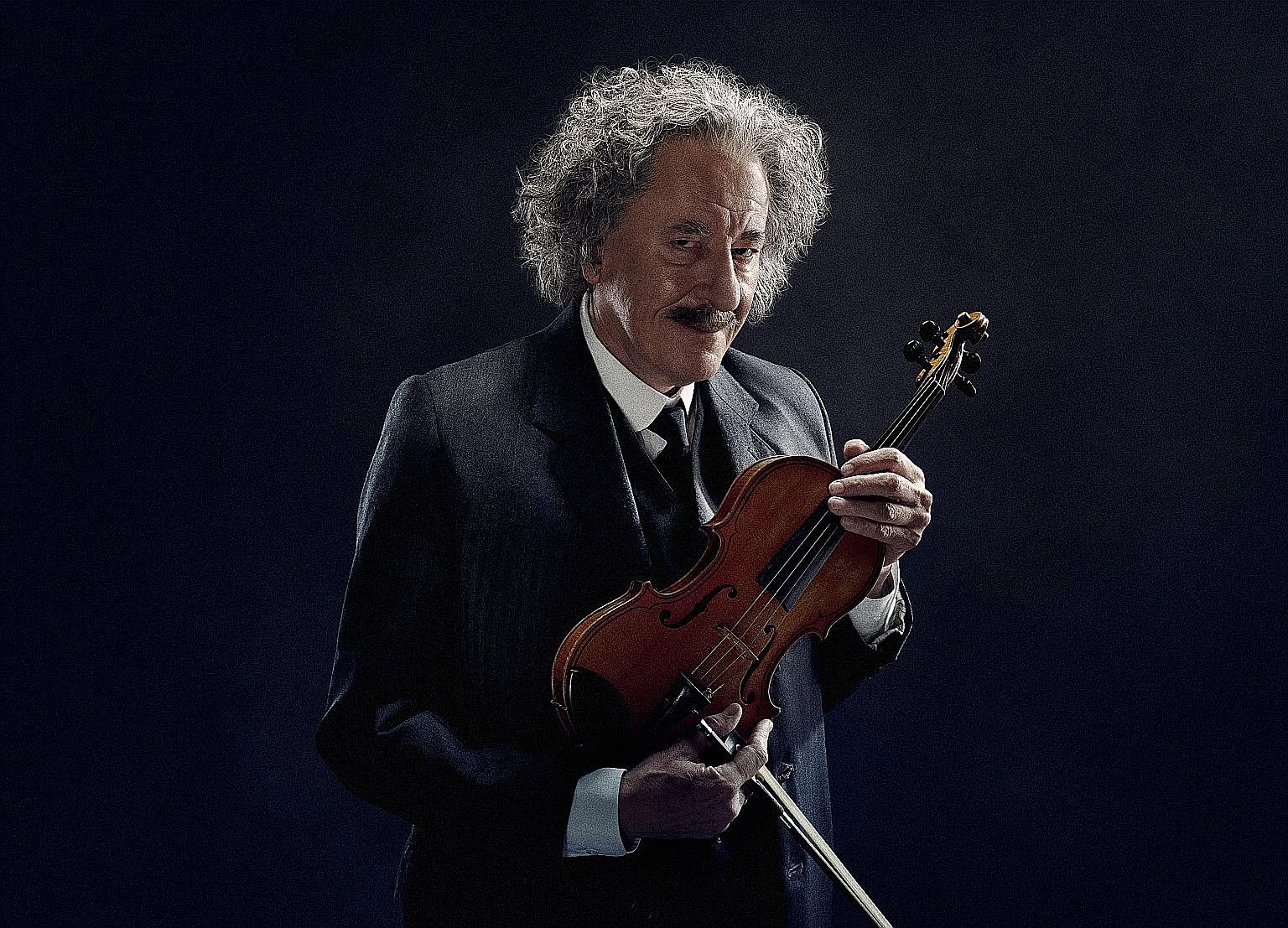The National Geographic Channel's absorbing new drama about the life of Albert Einstein starts with a bang: The first time you see the scientist is when he is engaged in extramarital exertions with his secretary and literally has his pants down.
Directed by Ron Howard, this and the rest of the pilot episode quickly signal that Genius, starring Geoffrey Rush as Einstein, is not going to be a hagiography of the man who forever changed people's understanding of space and time.
Nor is it that other biopic cliche: a paint-by-numbers portrait of a flawed-but-great man.
Instead, you get a thrilling tale of scientific discovery and setbacks set against a backdrop of ominously shifting political sands - and an unexpectedly clear-eyed critique of power and patriarchy in pre-World War II Europe.

The four episodes previewed trace Einstein's youth and early career, which progressed in fits and starts. Played in flashbacks by a younger actor, Johnny Flynn, he is seductively complex: a self-absorbed dreamer, a hesitant iconoclast, a guilt-ridden son and, when it comes to women, a bit of a cad.
The most pleasant surprise is that the writers take the time to tease out what is the biggest untold story of his life: his relationship with his first wife, Mileva Maric (Samantha Colley).
Maric is the brilliant fellow physicist whom he falls for at university but ends up dooming to a life in the shadows, thanklessly raising his child and helping him prove his groundbreaking theories - something he never gave her credit for, unlike Pierre Curie did with wife Marie when he insisted they share the 1903 Nobel Prize for Physics.
Examining the power dynamics within the Einsteins' marriage, as well as in academia and society, yields some of the most thoughtful moments of the show - for instance, Maric plaintively tells Einstein that she, as a female scientist, has been even more overlooked than he feels at the start of his career.
-
GENIUS
National Geographic Channel (Singtel TV Channel 201 and StarHub TV Channel 411)
Sundays, 7pm
4/5 stars
THE IMMORTAL LIFE OF HENRIETTA LACKS
HBO On Demand (StarHub TV Channel 602) and HBO on StarHub Go
3/5 stars
As for his discoveries, there is no equivalent of the wall-of-numbers scene from A Beautiful Mind (2001), Howard's Oscar-winning biopic of mathematician John Nash. That was a memorable way to demonstrate Nash's brilliance but, if you think about it, rather unilluminating.
Genius, on the other hand, makes an earnest attempt to explain the science using Einstein's famous thought experiments, which it animates using computer- generated imagery. It works, and pretty seamlessly, too - the blending of scientific, human and historical drama is so skilful, in fact, you may even forget this is the National Geographic Channel.
The Immortal Life Of Henrietta Lacks could have used some of that dexterity.
This television movie tells the little-known story of Lacks, the African-American woman whose unusually resilient cancer cells were harvested in 1951 without her knowledge and would go on to spur major medical advances as well as the birth of the biomedical industry.
Rebecca Skloot (Rose Byrne), a young white journalist, spends 10 years researching and writing a book about Lacks after gaining the trust of her daughter Deborah (Oprah Winfrey). Like the rest of the family, Deborah has been largely kept in the dark about her mother's cells and has not earned a cent from the billion-dollar industry that sprang up because of them.
It is a fascinating story and one with ethical ramifications that remain relevant today. Yet, in the hands of director George Wolfe, it becomes an unfocused ramble through medical ethics, racial politics and family melodrama.
The science is relatively straightforward and once that is explained, Wolfe rightly focuses - as Skloot did in her book - on the cultural, racial and personal legacies of what happened to the Lackses.
Their treatment was part of a bigger pattern of medical abuse and institutional racism suffered by African Americans. This and the infamous Tuskegee syphilis experiments on black men that began in the 1930s bred a deep mistrust of the medical profession that continues to blight African-American health outcomes today.
Deborah is the narrative focal point for this but, as able an actress as Winfrey is, the manic-depressive character's discombobulated rants make for uncomfortable viewing, especially without a more robust narrative frame to contain them.
Perhaps the director was going for verite, but it is tough to discern the highs and lows when the stress level is so often a nine out of 10.
And the emotional highs - such as in a scene where Deborah and the other in-fighting siblings finally get to see their mother's cells under a microscope - are excessively mawkish.
This story deserves more and Skloot's book probably does a better job of telling it.


